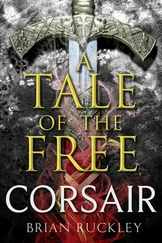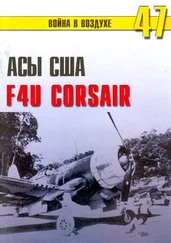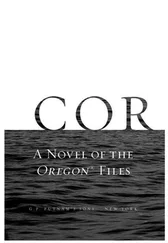Hector clenched his teeth. Every time he moved his injured leg, he felt a stab of pain from his ankle. Bourdon was reluctant to move out of his depth. ‘Come on, Jacques,’ Hector snapped angrily. ‘Dan and I will hold you up. Trust us.’ The Frenchman took a deep breath and floundered forward. He had the clumsy movements of a man who had never learned to swim properly. Hector reached out to hold his head out of water, and he was aware that Dan was supporting Jacques on the other side.
They made little progress. Bourdon was too frightened to relax. His frantic struggles only hindered them. Another musket ball struck the water just beside them – Hector saw the splash – and then went whirring onward.
Suddenly he felt Bourdon begin to sink. For a second he thought that the Frenchman had been hit. Then he knew that Dan had let go. Dan was swimming away.
Hector felt a brief surge of anger and disappointment. He had never expected Dan to abandon them. Then he looked up and saw that Dan was swimming strongly out into the river. He was heading towards the ship’s boat. It had stopped. One rower had dropped his oar in fright. The other rower was shouting at him.
Dan reached the rowboat. He gripped the gunwale and in one smooth wriggling movement had hauled himself aboard. He pushed the frightened oarsman aside and took his place. He barked an order at the man beside him, and began to spin the little craft. The musket fire from the beach had slackened. Hector wondered if perhaps the Moors were running out of powder and bullets. He concentrated on keeping Bourdon’s head above water until Dan had brought the little rowing boat close enough for him to grab on. He let go of Bourdon, who seized the boat so desperately that he nearly capsized it. With Hector pushing from below and Dan hauling him up, they hoisted Jacques into the boat, and a moment later the Frenchman was flopping on the floor boards like a landed fish. Then Hector pulled himself aboard.
The boat was over-loaded and sluggish in the water. Looking back towards the shore, Hector thought he could make out Karp’s body lying on the strand. There was the puff of smoke from a musket, but the bullet flew wide. A group of Moors was clustering around one of the dugout canoes. With the help of some blacks, they were beginning to shift it down the beach. Dan had been right. The dugout was an awkward burden, and they were making slow progress. There was still time to reach the anchored vessel.
Bourdon had recovered from his fright. He began to search for something to help the oarsmen. There was a wooden paddle lying half hidden in the bottom of the boat. The Frenchman tugged out the paddle and began to take great scoops at the water. The speed of the little boat increased. They were almost out of musket range.
Moments later they had reached the anchored vessel. Her side was low enough for them to scramble aboard without difficulty. On deck there were the usual heaps of rope, some sacks, wooden buckets. But no sign of life.
A musket shot, and this time the musket ball slapped into the side of the ship. The Moors had succeeded in launching their dugout, and it was now being paddled out from the beach. There was a single marksman in the bow. He had fired the shot. There must have been a dozen men in the leading dugout, and a second canoe was being launched.
Dan sprang into action. He ran forward to the bow, and began to throw off the coils of the anchor line. But the knots had jammed. He turned towards one of the two black men who had come aboard with them, and mimed a cutting gesture. The negro understood him at once. He groped under a piece of sacking. A moment later he produced a long-bladed knife and running up to the bows began to saw through the anchor line. The first strands sprang up as they were severed. The river current was so strong that the anchor line was taut as an iron bar. Half a dozen more strokes of the blade, and the anchor cable parted. Hector felt the vessel fall back as the current took hold of her.
‘Come on,’ Dan was standing at the foot of the mast beckoning. He had a rope in his hand. ‘Here haul on this! Jacques, you help him.’ Hector limped over and took the rope. Dan and the two blacks had begun to unfasten the bands which held the sail along the boom. Then he and Bourdon heaved on their rope and the upper spar rose, the sail opening beneath it. The blacks and Dan joined them and added their weight. There was no one at the helm so the boat was spinning slowly in the current. The riverbank was sliding past and above their heads the sail flapped three or four times. The gap between the vessel and the pursuing dugout was widening. ‘Almost there now,’ called Dan. ‘Make fast!’
The vessel began to gather pace. Looking aft, Hector saw the paddlers in the dugout had given up the chase. They were turning back to shore.

‘THERE WAS MUCH sickness on the ship,’ said a deep, husky voice. Hector swung round in surprise. The speaker was one of the blacks who had rescued them. The man noted his astonishment. ‘My name is Benjamin. I speak French and Portuguese also as I work with the foreign ships on the coast. When you ran down the hill, I thought you are runaway slaves so I wanted to help. I too was a slave once. Now I have been given my freedom. The foreign sailors call me a Laptot.’
‘We were slaves too, at one time.’
Now it was Benjamin’s turn to be taken aback. ‘Your dark-skinned friend here was a slave, that I understand. But I have never met white slaves before.’
‘We have reason to be grateful to you. Thank you for picking us up.’
Benjamin regarded him hopefully. ‘You are a ship’s captain?’
‘No. The most I’ve ever been is a captain’s secretary, or a galley slave. I’ve never been in charge of any ship.’
‘This ship needs a captain. The old one is dead, and so are the first and second mates. All died from the sickness. That is why we were anchored. We did not know what to do. Maybe it is your turn to help us.’
Benjamin went on to explain that he and his companion, another Laptot, had been hired when the sloop called at the Residence of St Louis, the French trading station at the river mouth. The two of them had helped bring the vessel upriver until, two weeks into their journey, a fever had broken out aboard. The hard-driving captain had refused to turn back. He insisted on proceeding until finally the crew were so short-handed that they had been forced to anchor and wait for the sickness to abate. But the fever had raged all the more fiercely. One by one the foreign crew had died until only the two Laptots were left alive. Unable to handle the vessel by themselves, they had been marooned.
‘What about the cargo?’ Hector asked.
‘We have touched nothing,’ Benjamin answered. ‘I will show you.’
Hector hobbled behind him as the Laptot led the way to a hatch, opened it, and disappeared below. As Hector’s eyes got accustomed to the gloom in the hold, he had a vivid recollection of the interior of the ship in which he had been carried away by Hakim Reis. But what he saw now was different. Along each side of the hull were built rows of shelves as if in a trading post. On them were stacked what looked like trade goods. There were bundles of chintz cloth, axe heads, knives, and iron agricultural tools, trays of brass medals. But many of the shelves were bare. They also seemed unnecessarily wide and the gap between them was barely eighteen inches.
‘Our captain had planned to go far upriver where there had been a native war. He was sure he would fill the shelves. He had already laid in stocks of food and water for the captives.’
Hector realised that he was looking at the interior of a slave ship. The wooden shelves were where the slaves would lie during the long passage to the Americas.
Читать дальше









